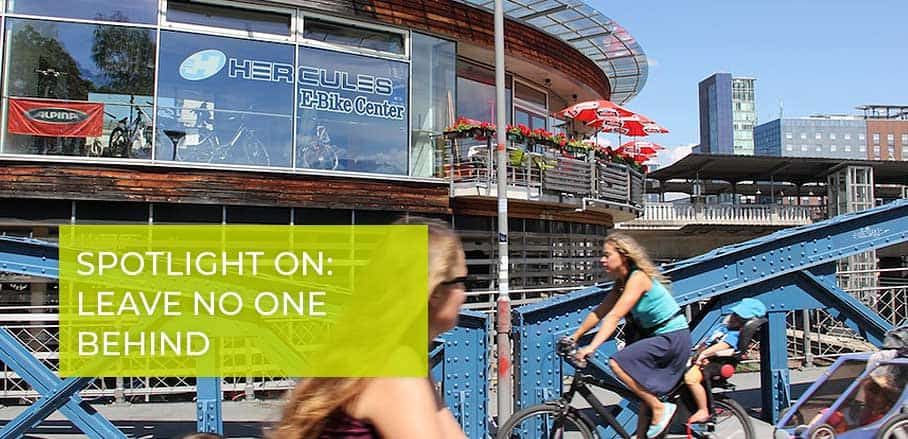Municipalities Are Learning Sustainability
Across Germany, municipal governments are increasingly engaged in sustainable development. Thus, they are playing a key role in the implementation of the 2030 Agenda, which will be assessed at the High-level Political Forum 2019. Robert Böhnke from the German Council for Sustainable Development outlines the learning processes that led and lead to municipalities’ increased engagement.
A Country of Islands
Smoking factory chimneys, cramped living conditions, rivers which served as open sewers – life in Germany’s inner cities during industrialisation was far from sustainable in many ways. Nowadays, former working-class neighbourhoods are among the most popular areas to live in and the air quality is better than it was several decades ago. We can see – and smell – that a large number of improvements have been made in our cities.
However, it is impossible to shake the feeling that many of the problems have merely been displaced. Just one example: Whereas factories were once responsible for the poor air quality in urban environments, many cities are now struggling with particulate and nitrogen oxide pollution caused by the ever-increasing volume of cars on roads.
Integrated urban development is a successful example of how the diversity and dynamism of urban developments can be implemented by means of planning. Nevertheless, there is no overarching systemic approach to sustainable urban development in Germany. Up to now, we have primarily seen stand-alone insular solutions such as car-free new neighbourhoods, brownfield sites being repurposed for commercial and residential use, and a renewed increase in mixed-use “urban districts” with housing, business premises, and manufacturing facilities.
At national level too, a small number of municipalities stand out as islands of sustainability. There is a lack of approaches which link transport, housing construction, climate protection, or energy production with one another across administrative areas. However, a number of pioneering municipalities have started developing their own ideas and solutions for a sustainable development, thereby sending out an important signal for sustainability policy at the state and national levels.
Learning from One Another – New Formats to Advance Municipal Sustainability
The German Council for Sustainable Development (RNE) established the “Sustainable City” dialogue back in 2010. More than 30 mayors are now involved in this initiative, of both cities like Dortmund, Freiburg, Münster, and Nuremberg and smaller towns like Ludwigsburg or Delitzsch. The dialogue enables mayors to discuss their own approaches to municipal sustainability policy in confidence. Thanks to joint publications and statements, the dialogue is also gaining national significance for municipal sustainability policy.
In addition to new dialogue formats, there are other good examples of initiatives which drive sustainability at municipal level and beyond. This is one of the objectives of the National German Sustainability Award for cities, towns, and communities which centres on putting municipal sustainability into practice politically. For instance, the city of Münster was awarded the National German Sustainability Award 2018 for its model for socially responsible land usage.
Establishing Structures – Municipalities are Learning Sustainability
Sustainable development is about more than individual projects and measures. The political approach behind it aims to overcome insular stand-alone solutions and silo mentality. The goals of the 2030 Agenda are “integrated and indivisible”; the mayors involved in the Sustainable City dialogue share this view.
In order for these goals to be implemented effectively, structures and responsibilities need to be established – with top-level political figures taking the lead. The mayors in towns and cities such as Münster, Freiburg, and Ludwigsburg have set up their own sustainability departments or management systems to give this issue the necessary clout and profile within their own administrative organisations.
Many municipalities have developed their own sustainability strategies based on the 2030 Agenda and the German Sustainable Development Strategy. In addition to this, a large number of municipalities are coming up with innovative new means of implementing sustainability even more strongly within local authorities.
By way of example, the city of Augsburg has developed its own sustainability check for all of the city council’s draft resolutions, generating awareness of the issue within the city council. On the initiative of Dortmund’s mayor, a strategic process was launched to make municipal procurement more sustainable. Meanwhile, the city of Freiburg has always used new and innovative ways of embedding the issue in both the municipality and the local authority. For instance, the city is working towards mapping sustainable development within the city’s budget. All of the measures and initiatives focus on establishing sustainability as the basis for decision-making by policymakers and local authorities alike.
The issue of sustainability is also gaining in importance at municipal enterprises. Many of these companies already report on their sustainability activities, for example with the aid of the Sustainability Code. Broad participation and involvement in urban society is crucial for this issue. The cities of Augsburg and Freiburg have set up their own advisory bodies for sustainability consisting of residents, local associations, and businesses.
A Country of Lakes
There is a long history of engagement on the part of German municipalities to promote sustainable development. In many places, this began with local agenda processes. Although only a small number of these were successful, the experience gained during the projects laid the foundations for the varied and growing engagement which we can see in municipalities today.
Many mayors are using this engagement as a starting point for developing structures for municipal sustainability activities. Today, municipalities no longer have to explain why they are involved in sustainable development – quite the opposite. Answers are needed to the pressing challenges. A large number of municipalities are working towards a systematic and comprehensive approach to the issue of sustainable development. Instead of insular stand-alone solutions, the focus now is on an integrated view and implementation of sustainable development. The islands are growing and the (unsustainable) sea is turning into lakes.
- Municipalities Are Learning Sustainability - 11. July 2019
